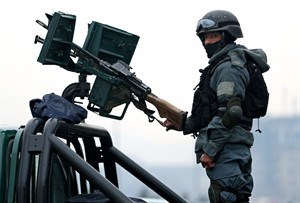
An Afghan policeman stands guard on a police vehicle at a check point during the first day of Afghanistan's presidential election campaign in Kabul, Afghanistan, Sunday, Feb. 2, 2014. Campaigning officially opened Sunday in Afghanistan’s presidential election, with 11 candidates vying to succeed President Hamid Karzai in polls seen as a crucial test of whether Afghanistan can ensure a stable political transition. (AP Photo/Massoud Hossaini)
February 02, 2014 - 6:17 AM
KABUL - Campaigning officially opened Sunday in Afghanistan's presidential election, with 11 candidates vying to succeed President Hamid Karzai in polls seen as a crucial test of whether Afghanistan can ensure a stable political transition.
The April 5 presidential vote will be held in a climate of uncertainty as NATO combat forces ready their withdrawal at the end of 2014. If successful, the election will usher in the first handover from one elected president to another in Afghan history.
Karzai, who has led Afghanistan more than 13 years after the intervention to oust the Taliban's extremist Islamic regime for sheltering al-Qaida's leadership after the Sept. 11 terrorist attacks on the U.S, is constitutionally barred from running for a third term.
The election faces many hurdles: allegations of vote-rigging marred the 2009 election and security is a major concern. The eventual winner will face the tough task of continuing to fight the bloody Taliban insurgency, overseeing the end to the international coalition's mission in the country and possibly deciding if any residual foreign forces will remain next year.
The spectre of violence hangs over the campaign season, with the Taliban vowing to disrupt the poll. On the eve of the campaign launch, two political workers were killed in western Afghanistan.
On a cold and rainy Sunday morning in Kabul, campaign workers hastened to hang posters on lampposts and plaster their candidates' faces on billboards. Several political heavyweights including opposition leader Abdullah Abdullah and former finance minister Ashraf Ghani held rallies in local wedding halls, while security forces with machine-guns guarded the venues.
There is no clear front-runner, though opposition leader Abdullah arguably has an early advantage in name recognition and campaign experience, having gained 31 per cent of the vote as runner-up to Hamid Karzai in the disputed 2009 elections.
Abdullah, who launched his official campaign with the release of several doves symbolizing peace, voiced strong support for Afghanistan entering into a security agreement that would allow a few thousand foreign forces to remain to train and equip Afghanistan's army and police, saying the country still needs outside support.
"God willing, with the signing of this agreement, today or tomorrow, the concerns of our people would be over," Abdullah told supporters.
Karzai has refused to sign the agreement, and none of the other candidates has spoken out on the issue.
The lineup of other candidates illustrates that patronage and alliances among the elite still form the bedrock of Afghanistan's politics, where tribal elders and warlords can marshal votes.
The contenders include Ashraf Ghani, a Pashtun former finance minister who oversaw the transition of security from foreign forces to the Afghan army and police, and who ran and lost in the 2009 elections. He promised that if elected, he would strengthen stability across the country, where insurgent attacks and bombings are a daily reality.
"This campaign is for the people, and starting from here, I believe that there will not be any fraud this time," Ghani said.
Like many of the candidates, Ghani picked a running mate in an attempt to bridge Afghanistan's ethnic divides. He tapped former warlord Gen. Abdul Rashid Dostum — who is thought to control the majority of the ethnic Uzbek vote — as his one of his two potential vice-presidents.
The country's population of 31 million is roughly 42 per cent Pashtun, 27 per cent Tajik, 9 per cent Hazara, and 9 per cent Uzbek along with other, smaller groups. The Taliban are predominantly Pashtun, and Karzai is also Pashtun.
Karzai's former foreign minister Zalmai Rassoul, a Pashtun, is running with Ahmad Zia Massoud, the Tajik brother of Ahmad Shah Massoud, the commander of the Northern Alliance resistance to the Taliban who was assassinated in an al-Qaida suicide bombing two days before Sept. 11, 2001. Rassoul is a former national security adviser to the government who could up end being a consensus candidate among many political factions.
Also running is Abdul Rab Rasoul Sayyaf, whose long history as a jihadist and alleged past links to Arab Islamic militants make him possibly the most controversial candidate and biggest potential worry to Afghanistan's international allies.
Sayyaf, an influential Pashtun lawmaker and Islamic scholar, may appeal to Afghanistan's large numbers of religious conservatives. He is running with former energy and water minister Ismail Khan, a powerful Tajik.
Rounding out the others tipped to be main contenders is Qayyum Karzai, businessman brother of the president.
While the field could narrow as the campaign grinds on, none of the candidates is expected to garner the majority needed to avoid a runoff. President Karzai has so far not endorsed any candidate.
___
Associated Press writer Cassandra Vinograd in Kabul contributed to this report.
News from © The Associated Press, 2014